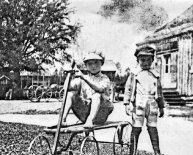March 25, 2017

Boy Scouts California Camps in Georgia
On Wednesday, October 29, the Boy Scouts of America announced its 2014 Sustainability Award recipients during the Sustainability Summit at the Greenbrier Resort in West Virginia.
The National Council presented the awards in the following five categories: Regional Excellence, Individual (volunteer), Corporate (company leadership), Vision and Leadership, and Excellence in Sustainability Education.
Regional Excellence in Sustainability
- Illowa Council’s Loud Thunder Scout Reservation (Central Region)—This 200‑acre camp near Andalusia, Illinois, was recognized for its model aquaponics system, which uses modern technology with ancient roots to combine aquaculture (raising edible fish) with hydroponics (growing vegetables and herbs without soil). Loud Thunder’s aquaponics system cost less than $500 to build, and is providing Scouts valuable lessons in sustainability.
- aurel Highlands Council’sCamp Guyasuta (Northeast Region)—A few years ago, Camp Guyasuta was attracting 3, 200 Scouts and losing a quarter-million dollars a year. Rather than shut down the camp, the council built the 12, 000‑square‑foot McGinnis Education Center. The green-level LEED facility features a dormitory, dining facility, and conference rooms. Today, Scouts, churches, school groups, inner-city nonprofits, corporations, and universities use the facility, contributing $50, 000 to $60, 000 annually to the council’s budget.
- Sea Scout Base Galveston (Southern Region)—The sparkling new Sea Scout Base Galveston has a five-story, 60, 000‑square‑foot headquarters built to LEED Platinum standards—one of America’s highest standards for green buildings. In addition to being the site of the BSA’s first building to earn this distinction, the base features an extensive network of solar panels and a rainwater-harvesting system. It is making a major impact on kids’ lives while having little negative impact on the environment.
- Western Los Angeles County Council’s Camp Emerald Bay (Western Region)—Water conservation is a major concern in California, which is facing an historic three‑year drought. Californians have been asked to cut their water consumption by 20 percent. Over the last three years, the camp reduced its water consumption by more than half. For example, the camp installed spring-loaded water fountains and sinks, showers with pull-string faucets, and low/high flush valves. It is diverting graywater into planter boxes and educating campers about water conservation through signage and television monitors that show real-time water‑usage facts, resulting in less water usage, lower water bills, and an increased understanding of the need to conserve water.
Corporate Sustainability
- SolarCity (headquartered in California’s Bay Area)—SolarCity’s willingness to collaborate with the BSA regardless of different social ideologies is commendable. This collaboration resulted in financial support at the national level to increase awareness of sustainability.
- Interface (headquartered in LaGrange, Georgia)—Interface’s collaboration with the BSA resulted in the launch of the Sustainability merit badge and jamboree activities. Interface has demonstrated leadership in the industry and has continued to provide financial support toward the BSA’s sustainability efforts.
Individual (volunteer)
- Tim Beaty—recognized for his countless hours of dedication to the stewardship of the William T. Hornaday Award, which recognizes Scouts and Scouters who have made significant contributions to conservation.
Vision and Leadership Award
- Ray C. Anderson Foundation—created in honor of the late Ray C. Anderson, founder of Interface Inc., which has become a leading innovator in environmental stewardship and sustainability. The foundation strives to build a better world for future generations through research and funding.
Excellence in Sustainability Education
- Orange County Council’s Irvine Ranch Outdoor Education Center—this 210‑acre outdoor education center features half- through five-day academic and recreational programs that provide hands-on approaches to exploring the outdoors, enabling participants to develop their leadership skills and respect for the environment in a creative setting. The K‑12 academic programs are aligned with California Content Standards. The programs focus on science and social studies, language arts, math, physical education, and visual and performing arts.

















